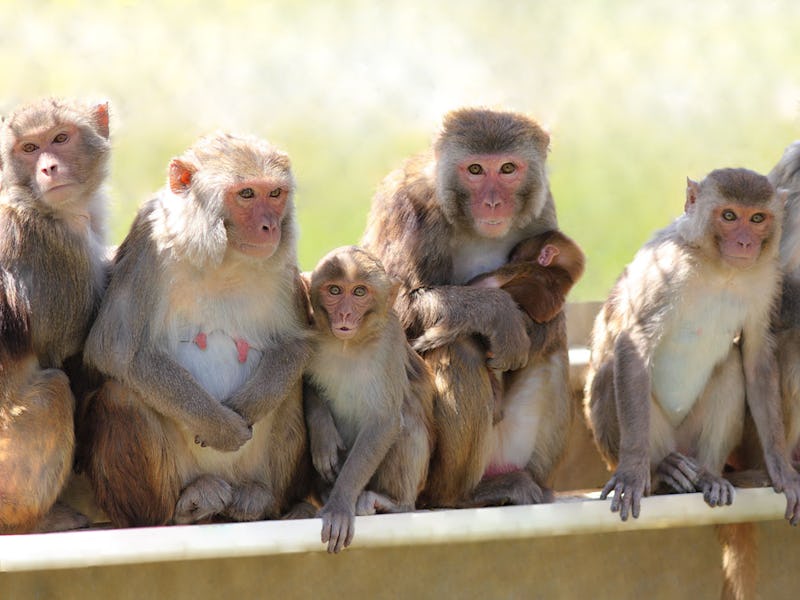Researchers Develop a Non-Surgical Alternative to the Vasectomy
If it works on monkeys, it'll probably work on humans, too.

Vasalgel™ — a non-pharmaceutical, non-toxic gel — has proven to be an effective male contraceptive on the rhesus macaque, keeping the monkeys reliably sterile for two-and-a-half years and counting, and offering a potentially reversible alternative to vasectomies in humans.
Researchers at the California National Primate Research Center at UC Davis announced their findings on Monday in the journal Basic and Clinical Andrology. Currently, vasectomies technically are reversible, but the procedure is expensive, complicated, and is probably only effective in about half of all cases.
“And even then, it’s not that you’re back up to speed again, if you know what I mean,” Dr. Catherine VandeVoort, the paper’s lead author, tells Inverse. “It doesn’t reverse to 100 percent of pre-vasectomy function. And [while] a vasectomy can be performed by many physicians, reverse vasectomy is a very specialized surgery. At UC Davis, we have a urologist who specializes in doing almost nothing but reversals.”
So, Vasalgel, a “high molecular weight polymer,” might one day be a good option for men who think they won’t have kids but change their minds later. Exactly how much later, we don’t yet know. Men can keep pumping out functional baby juice decades after women become infertile, and VandeVoort and her team haven’t been able to observe any subjects for that long. The first batch of monkeys injected more than two years ago are still going strong; previously the researchers had tested on rabbits, over which the monkeys are a significant improvement. In addition to just living longer, the reproductive tracts in monkeys are set up very much like those you’d find in human males.
“This is very similar to what you might see in humans,” VandeVoort says. “[The side effects] are the same common side effects of regular vasectomies in men, and in male monkeys as well.”
The gel is highly viscous and works by essentially plugging the vas deferens — the sperm tunnel connecting the testicles to the urethra — ideally lasting for years, perhaps even decades. Since it so far seems to be both safe and effective, the next step is determining how long it lasts and whether it will indeed be reversible. With rabbits, the researchers essentially flushed the gel out with a saline solution, and maybe that coupled with ultrasound waves — whatever works to break up the material — could one day work as birth control for human men. And if it is effectively reversible, we’ll also need to determine if the outcome is the same over time — i.e., will a man who had the gel removed after five years experience the same return to form of a man who had it removed after two?
VandeVoort and her colleagues are now in need of new funding to pursue that line of research. If they get it, it might do some good for a culture that still places the burden of reproductive health overwhelmingly on women.
“Certainly injecting the [vas deferens] is much less traumatic than what you have to do for a vasectomy, crushing it with a clamp instrument or taking a long section and cauterizing it,” VandeVoot said. “I think it’s really important that we provide men with some new contraceptive options.”
Ha Long Bay Vietnam
Abstract:
Background: Options for male contraception are limited. The purpose of this study was to use a nonhuman primatemodel to evaluate Vasalgel™, a high molecular weight polymer being developed as a contraceptive device for men.
Methods: Sixteen adult male rhesus monkeys received intravas injections of Vasalgel, consisting of 25% styrene maleicacid in dimethyl sulfoxide. After a one-week recovery, males were returned to outdoor group housing, which includedat least 3 and up to 9 intact, breeding females with a successful reproductive history.
Results: Treated males have had no conceptions since Vasalgel injections. All males were housed with intact females for at least one breeding season and seven have been almost continually housed with females for 2 years. Complications were minor and included one incident of incorrect placement of Vasalgel into the vas deferens and the development of a sperm granuloma in one animal. Three unilateral vasectomies were performed, one was necessary for incorrect placement of Vasalgel, the other two were elective.
Conclusions: Intravas injection of Vasalgel in sexually mature adult male rhesus monkeys was effective in preventing conception in a free-living, group environment. Complications were few and similar to those associated with traditional vasectomy.